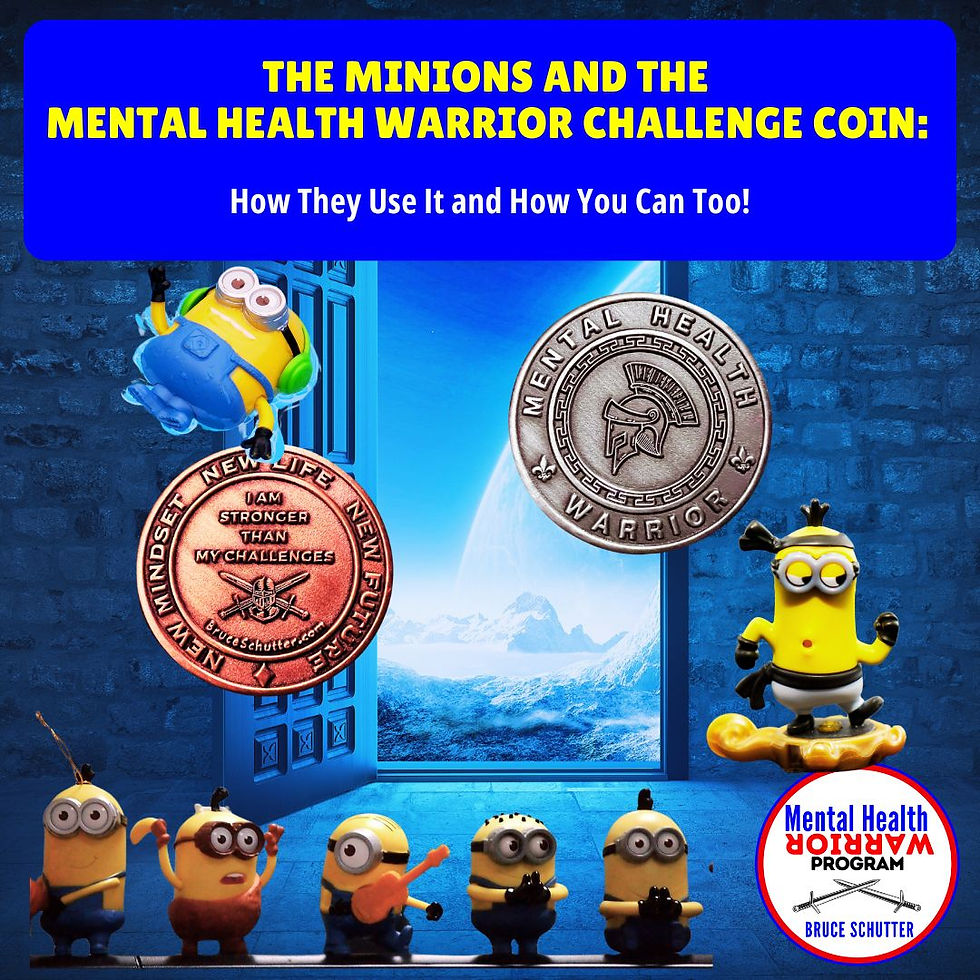Manage the Stress of Current Events: 3 Mental Health Warrior Actions (with Help from John Wick)
- Bruce Schutter

- 3 days ago
- 4 min read

So, there we were—John Wick and I—nursing our diet sodas in a downtown diner, both reeling from the weight of current events. Who would’ve thought? Me, a Mental Health Warrior, and John, the ultimate action hero, sitting together—confounded not by high-stakes chases or epic showdowns, but by the sheer volume of stress coming from every news headline.
“Bruce,” John said with his trademark intensity, “how do you handle it all?” He stirred his coffee, looking contemplative—maybe even a little haunted. “I’m good at handling... intense situations. But this constant stream of stress? It’s... different.”
Now, John’s a fellow Warrior. He knows my story—how I spent 20 years battling Bipolar, Alcoholism, Anxiety Disorders, and PTSD. I hit rock bottom and tried to end my life. But through that darkness, I discovered something life-changing: mental health is the key to overcoming any challenge.
With that knowledge, I created the Mental Health Warrior Program—a new SELF-HELP approach designed to help anyone take charge of their emotions, overcome challenges and build the life they really want.
“Well,” I said, “the Mental Health Warrior Program has enough power for both of us to get through the madness. So let’s think—what would we tell our friends right now if they asked how to keep it together?”
John nodded, ready for action—even if this time, the mission didn’t involve expertly-handled firearms.
After some back-and-forth, we came up with three actions, any Mental Health Warrior can use, to stay grounded, resilient and ready to take on the world!
Action 1: Take Care of You
“Step one,” I said, “is taking care of yourself. When you’re angry or overwhelmed, that’s the moment challenges start circling like vultures. Don’t give them the advantage. The strongest thing we can do each day, is to take time to check in and process our emotions. That’s how we stay in the game—because when we’re in control, we can handle whatever gets thrown at us.”
John looked thoughtful, probably imagining this in a warehouse filled with bad guys and explosions. “So you’re saying, before I leap into action, I’ve got to make sure I’m not just reacting on autopilot?”
“Exactly,” I said, nodding. “Respond—don’t react. It’s Mental Health Warrior 101.”
John’s Takeaway:
John considered that. “Okay. Let’s say I’m chasing a guy who double-crossed me—again. And suddenly, I feel like I’m about to snap. Maybe instead of kicking down a door, I take a second to breathe, check in, and reset. That way, I stay sharp—and in control.”
I grinned. “That’s it. In that moment, you’re not just surviving—you’re leading with strength.”
Action 2: Lean on Your Tribe
“Next up,” I said, “is leaning on your tribe. When life feels like a nonstop barrage—bad news, stress, uncertainty—it’s easy to fall into the trap of thinking we have to handle it all alone. But here’s the truth: we’re all seeing the same chaos, and we all need connection to stay grounded.
Having people you can be honest with is one of the strongest tools you can use.”
John’s Takeaway:
John’s stoic look softened a bit. He nodded slowly. “Even I don’t go it alone. When things go sideways, I’ve got a few people—Winston, the Bowery King. I may be the one facing the heat, but knowing they’ve got my back—that’s what keeps me going. We don’t always talk feelings… but we don’t have to. Their presence means everything.”
“Exactly,” I said. “Support doesn’t always mean a therapy session—it means someone who reminds you you’re not alone in this fight. Mental Health Warriors need that kind of connection to stay clear-headed, motivated, and emotionally steady.”
Action 3: Control the Controllables
“Alright, last but not least,” I said, “we’ve got to focus on what’s actually within our control. When the world feels like it’s spiraling, that’s when Mental Health Warriors double down on what they can influence: your next meal, who you spend time with, your morning routine, a quick workout—small actions that add up to major strength.”
John smirked, probably thinking back to some impossible mission where controlling the chaos was the only path forward. “I get that,” he said. “When I’m outnumbered and outgunned, I don’t focus on what I can’t do—I zero in on what I can. What you’re saying is… apply that to everyday life.”
“Right!” I said. “If we put our energy into what we can directly influence, we get a sense of purpose, and every action feels like progress. This way, even with all the noise around us, we’re building something real.”
John’s Takeaway:
John nodded, slowly and thoughtfully. “So, when I’m feeling overloaded? I make a plan. Could be training, gathering intel, checking in with allies—whatever it is, it’s mine to own. I can’t stop what’s happening out there... but I can take the next right action. That’s how I stay in the fight.”
Wrap Up
By now, we’d both finished our diet sodas, and John was looking more resolute. “You know, Bruce,” he said, “I’m glad we had this talk. The Mental Health Warrior Program—it’s something else. It’s not just practical... it’s empowering!
Taking control, leaning on allies, focusing on what’s right in front of us—that’s how we stay strong, no matter what’s happening around us.”
I chuckled. “See? Even the ultimate action hero can appreciate the power of a solid self-help approach. We’ve all got battles—and this is how we fight them.”
Because at the heart of the Mental Health Warrior Program is this truth: when we take charge of our emotions and stay grounded in action, we become stronger—day by day, moment by moment. In a world spinning with uncertainty, that kind of mindset isn’t just helpful… It’s unstoppable!
Bruce Schutter




Comments